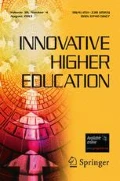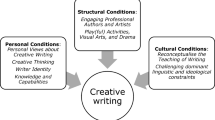Abstract
Scholarship about ethics in higher education often focuses on wrongdoing: cheating, incivility, and a host of other misdeeds. We focus, instead, on ethicality as the enactment of integrity across everyday work life. This approach is particularly true in student affairs where administrators, faculty members, staff members, and students intersect multiple social and professional arenas. Continuing the analysis of data from a previous study, we examined what it means “to be ethical,” especially in relationship to institutional and professional standards. We use theatrical metaphor techniques to explore scripting, staging, performing, and interpreting. Discussion centers on the spectacle of ethics in student affairs.
Similar content being viewed by others
References
Attride-Stirling, J. (2001). Thematic networks: An analytic tool for qualitative research. Qualitative Research, 1, 385–405. https://doi.org/10.1177/146879410100100307
Benford, R. D., & Hunt, S. A. (1992). Dramaturgy and social movements: The social construction and communication of power. Sociological Inquiry, 62, 36–55.
Blimling, G. S. (1998). Navigating the changing climate of moral and ethical issues in student affairs. In D. Cooper & J. Lancaster (Eds.), Beyond law and policy: Reaffirming the role of student affairs. New Directions for Student Services (Vol. 82, pp. 65–76). San Francisco: Jossey-Bass. https://doi.org/10.1002/ss.8206.
Boje, D. M., Rosile, G. A., Durant, R. A., & Luhman, J. T. (2004). Enron spectacles: A critical dramaturgical analysis. Organization Studies, 25, 751–774. https://doi.org/10.1177/0170840604042413
Bruner, J. (1990). Acts of meaning. Cambridge, MA:Harvard University Press.
Chassey, R. (2002). Morals, ethics, and the campus community: Implications for student development. Washington, DC:U.S. Department of Education educational resources information center, document release ED 465 133.
Corbin, J., & Strauss, A. (1990). Grounded theory research: Procedures, canons, and evaluative criteria. Qualitative Sociology, 13, 3–21. https://doi.org/10.1007/BF00988593
Couch, S., & Dodd, S. (2005). Doing the right thing: Ethical issues in higher education. Journal of Family and Consumer Sciences, 97(3), 20–26.
Council for the Advancement of Standards (2006). CAS professional standards for higher education (6th ed.). Washington, DC:Author.
Council for the Advancement of Standards in Higher Education (n.d.). See http://www.cas.edu/
Debord, G. (1967). Society of the spectacle. Paris, France:Buchet/Chastel. Retrieved from http://library.nothingness.org/articles/SI/en/pub_contents/4
Degen, G., & Sheldahl, E. (2007). The many hats of teaching in small colleges: The seamless web of student and academic affairs. New Directions for Student Services, 117, 47–56.
Goffman, E. (1959). The presentation of self in everyday life. New York, NY:Doubleday.
Gurr, A., & Ichikawa, M. (2000). Staging in Shakespeare’s theatres. New York, NY:Oxford University Press.
Howe, K., & Moses, M. (1999). Ethics in educational research. Review of Research in Education, 24, 21–60.
Humphrey, E., Janosik, S. M., & Creamer, D. G. (2004). The role of principles, character, and professional values in ethical decision-making. NASPA Journal (online), 41, 675–692.
Hunt, S. A., & Benford, R. D. (1997). Dramaturgy and methodology. In G. Miller & R. Dingwall (Eds.), Context and method in qualitative research (pp. 106–118). Thousand Oaks: SAGE.
Kelley, P. C., & Chang, P. L. (2007). A typology of university ethical lapses: Types, levels of seriousness, and originating location. The Journal of Higher Education, 78, 402–429. Retrieved from https://doi.org/10.1353/jhe.2007.0024
Kitchener, K. S. (1985). Ethical principles and ethical decisions in college student affairs. In H. J. Cannon & R. D. Brown (Eds.), New Directions for Student Services: Applied Ethics in Student Services, 30 (pp. 17–29). San Francisco: Jossey-Bass.
Landau, R., & Osmo, R. (2003). Professional and personal hierarchies of ethical principles. International Journal of Social Welfare, 12, 42–49. Retrieved from https://doi.org/10.1111/1468-2397.00007
Lincoln, Y. S. (2000). When research is not enough: Community, care, and love. The Review of Higher Education, 23, 241–256.
McDonald, W. M., Ebelhar, M. W., Orehovec, E. R., & Sanderson, R. H. (2006). Ethical decision making: A teaching and learning model for graduate students and new professionals. Student Affairs Journal, 25, 152–165.
Miller, G. (1997). Toward ethnographies of institutional discourse: Proposal and suggestions. In G. Miller & R. Dingwall (Eds.), Context and method in qualitative research (pp. 155–171.) Thousand Oaks: SAGE.
National Association of Student Affairs Administrators in Higher Education (n.d.). See http://www.naspa.org/
National Center for Educational Statistics (2013). Digest of educational statistics. Retrieved from http://nces.ed.gov/
Patton, M. Q. (2015). Qualitative research and evaluation methods (4th ed.). Thousand Oaks, CA:SAGE.
Reybold, L. E. (2008). The social and political structuring of faculty ethicality in education. The Journal of Innovative Higher Education, 32(5), 279–295. https://doi.org/10.1007/s10755-007-9053-9.
Reybold, L. E. (2014). The irony of ethics: (De)Coding the lived experience of women and minority faculty in education. International Journal of Higher Education, 3(2), 92–105. https://doi.org/10.5430/ijhe.v3n2p92.
Reybold, L. E., Halx, M. D., & Jimenez, A. L. (2008). Professional integrity in higher education: A study of administrative staff ethics in student affairs. Journal of College Student Development, 49(2), 110–124. https://doi.org/10.1353/csd.2008.0013.
Riggio, R. E., & Orr, S. S. (Eds.). (2004). Improving leadership in nonprofit organizations. San Francisco, CA:Jossey-Bass.
Slobogin, K. (2002). Survey: Many students say cheating’s OK. Retrieved from http://www.cnn.com/2002/fyi/teachers.ednews/04/05/highschool.cheating/
Starratt, R. J. (2004). Ethical Leadership. San Francisco, CA:Jossey-Bass.
Sundberg, D. C., & Fried, J. (1997). Ethical dialogues on campus. In J. Fried (Ed.), Ethics for today’s campus: New perspectives on education, student development, and institutional management (pp. 67–79). New Directions for Student Services, 77. San Francisco, CA:Jossey-Bass. https://doi.org/10.1002/ss.7701
Weaver, G. R., Treviño, L. K., & Cochran, P. L. (1999). Integrated and decoupled corporate social performance: Management commitments, external pressures, and corporate ethics practices. The Academy of Management Journal, 42, 539–552.
Wexler, M. N., & Havers, G. (2002). Conspiracy: A dramaturgical explanation. International Journal of Group Tensions, 31, 247–266.
Wotruba, T. R., Chonko, L. B., & Loe, T. W. (2001). The impact of ethics code familiarity on manager behavior. Journal of Business Ethics, 33, 59–69.
Author information
Authors and Affiliations
Corresponding author
Rights and permissions
About this article
Cite this article
Reybold, L.E., Halx, M.D. Staging Professional Ethics in Higher Education: a Dramaturgical Analysis of “Doing the Right Thing” in Student Affairs. Innov High Educ 43, 273–287 (2018). https://doi.org/10.1007/s10755-018-9427-1
Published:
Issue Date:
DOI: https://doi.org/10.1007/s10755-018-9427-1




